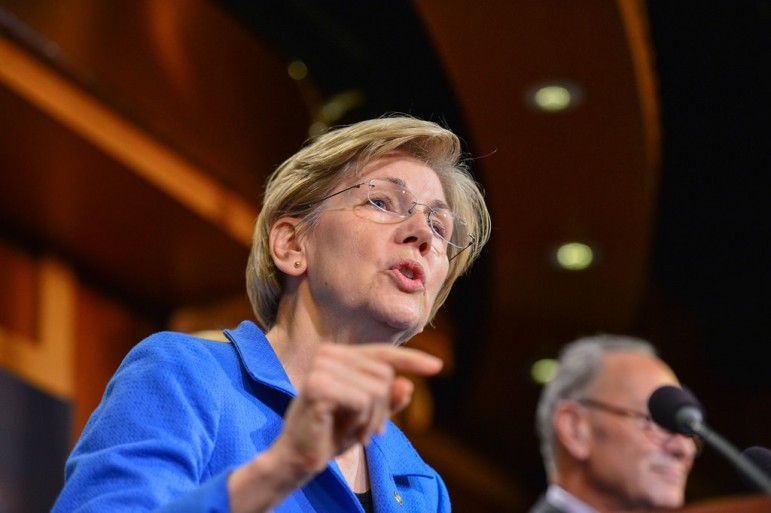
September 27, 2015; Washington Post
Senator Elizabeth Warren (D-MA) concluded a recent speech sponsored by the Edward M. Kennedy Institute for the United States Senate with these words: “The first civil rights battles were hard fought. But they established that Black Lives Matter. That Black Citizens Matter. That Black Families Matter. Half a century later, we have made real progress, but we have not made enough progress.” Her remarks, which were unusually candid for an American politician, went beyond an analysis of the policies needed to address pressing social issues to recognize the importance of hearing the voices who articulate the reality of living as a Black American.
Senator Warren saw the progress made by the Civil Rights Movement of fifty years ago to close the gaps between white and black America, but strongly underscored that much remains to be done, and that in some areas we have actually fallen further behind:
A half-century ago…entrenched, racist power did everything it could to sustain oppression of African-Americans, and violence was its first tool. Lynchings, terrorism, intimidation. The 16th Street Baptist Church. Medgar Evers. Emmett Till. When Alabama Governor George Wallace stood before the nation and declared during his 1963 inaugural address that he would defend “segregation now, segregation tomorrow, segregation forever,” he made clear that the state would stand with those who used violence.
But violence was not the only tool. African Americans were effectively stripped of citizenship when they were denied the right to vote. The tools varied-literacy tests, poll taxes, moral character tests, grandfather clauses-but the results were the same. They were denied basic rights of citizenship and the chance to participate in self-government.
The third tool of oppression was to deliberately deny millions of African Americans economic opportunities solely because of the color of their skin…. Coming out of the Great Depression, from the 1930s to the late 1970s, as GDP went up, wages went up for most Americans. But there’s a dark underbelly to that story. While median family income in America was growing—for both white and African-American families—African-American incomes were only a fraction of white incomes. In the mid-1950s, the median income for African-American families was just a little more than half the income of white families.
While recognizing that much has changed for better since George Wallace’s infamous words, “segregation now, segregation tomorrow, segregation forever,” were uttered, Senator Warren clearly outlined where we have fallen painfully short:
Fifty years later, violence against African Americans has not disappeared…we know—and say—the names of those whose lives have been treated with callous indifference. Sandra Bland. Freddie Gray. Michael Brown. We’ve seen sickening videos of unarmed, black Americans cut down by bullets, choked to death while gasping for air—their lives ended by those who are sworn to protect them. Peaceful, unarmed protestors have been beaten…We must be honest: Fifty years after John Kennedy and Martin Luther King, Jr. spoke out, violence against African Americans has not disappeared.
Sign up for our free newsletters
Subscribe to NPQ's newsletters to have our top stories delivered directly to your inbox.
By signing up, you agree to our privacy policy and terms of use, and to receive messages from NPQ and our partners.
And what about voting rights? Two years ago, five conservative justices on the Supreme Court gutted the Voting Rights Act, opening the floodgates ever wider for measures designed to suppress minority voting. Today, the specific tools of oppression have changed-voter ID laws, racial gerrymandering, and mass disfranchisement through a criminal justice system that disproportionately incarcerates black citizens. The tools have changed, but black voters are still deliberately cut out of the political process.
And what about economic injustice? […] Just as this country was taking the first steps toward economic justice, the Republicans pushed a theory that meant helping the richest people and the most powerful corporations get richer and more powerful…. From 1980 to 2012, GDP continued to rise, but how much of the income growth went to the 90 percent of America—everyone outside the top 10 percent—black, white, Latino? None. Zero. Nothing. One hundred percent of all the new income produced in this country over the past 30 years has gone to the top ten percent…For African-Americans, who were so far behind earlier in the 20th Century, this means that since the 1980s they have been hit particularly hard. In January of this year, African-American unemployment was 10.3 percent—more than twice the rate of white unemployment. And, after beginning to make progress during the civil rights era to close the wealth gap between black and white families, in the 1980s the wealth gap exploded, so that from 1984 to 2009, the wealth gap between black and white families tripled. The 2008 housing collapse…hit African-Americans like a punch in the gut. Because middle class black families’ wealth was disproportionately tied up in homeownership and not other forms of savings, these families were hit harder by the housing collapse.
Her remarks did include specific policy recommendations to address the serious divide between white and black America that remains to be closed, but more importantly she recognized that as a White American, she cannot know what it is to live as a Black American, stressing the importance of hearing the new voices that are being raised from within the Black Community.
I speak today with the full knowledge that I have not personally experienced and can never truly understand the fear, the oppression, and the pain that confronts African Americans every day. But none of us can ignore what is happening in this country. Not when our black friends, family, neighbors literally fear dying in the streets. Listen to the brave, powerful voices of today’s new generation of civil rights leaders. Incredible voices. Listen to them say: “If I die in police custody, know that I did not commit suicide.” Watch them march through the streets, “hands up don’t shoot”—not to incite a riot, but to fight for their lives. To fight for their lives. This is the reality all of us must confront, as uncomfortable and ugly as that reality may be. It comes to us to once again affirm that black lives matter, that black citizens matter, that black families matter.
The Washington Post underscored how this level of personal recognition set Senator Warren apart from other major political leaders. “Warren’s address…was perhaps the most full-throated endorsement to date by a federal lawmaker for the ongoing protest movement, and it drew immediate praise from some of the most visible activists.”
DeRay Mckesson, a prominent activist, told the Post that “Senator Warren’s speech clearly and powerfully calls into question America’s commitment to black lives by highlighting the role that structural racism has played and continues to play with regard to housing discrimination and voting rights…Warren, better than any political leader I’ve yet heard, understands the protests as matter of life or death—that the American dream has been sustained by an intentional violence and that the uprisings have been the result of years of lived trauma.”
Senator Warren’s willingness to recognize the challenge beyond the policy level is unique. Daunasia Yancey, a Black Lives Matter Boston activist, said to The Guardian, “Senator Warren really understood that lives are at stake here. Other [politicians] hear ‘Black Lives Matter’ and they say ‘absolutely.’ They say that, and they leave it there, and they don’t have policies to back it up and they don’t necessarily have a long-term historic lens. […] I think Elizabeth Warren has really raised the bar.”
Warren’s challenge was clear and direct as she framed her beliefs on what our national dialogue about race and economic equity should be about. Whether other political leaders will pick up this conversation as the election season heats up will be interesting to see.—Martin Levine













